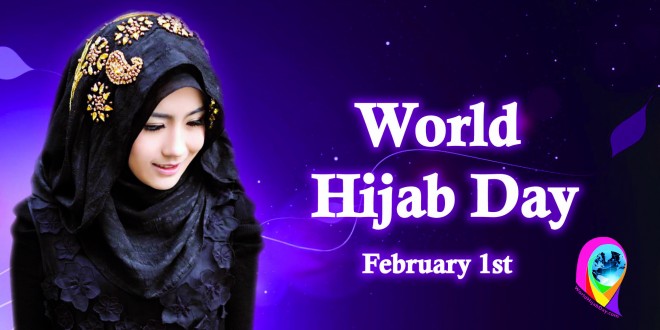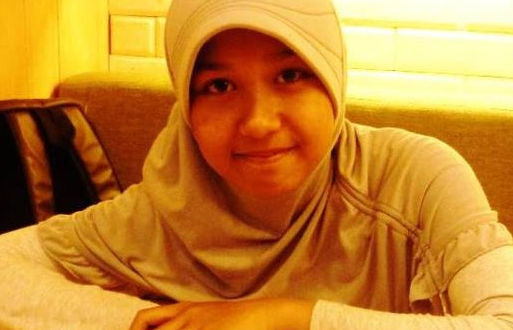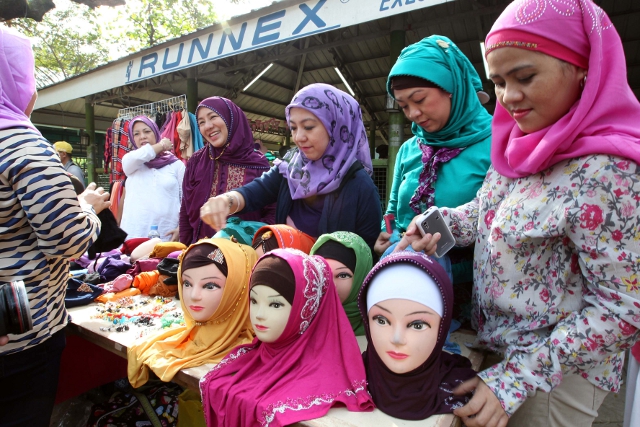WORLD HIJAAB DAY: FEB 1ST

THE MESSAGE OF WORLD HIJAB DAY:
BETTER UNDERSTANDING, GREATER AWARENESS, PEACEFUL WORLD
WORLD HIJAAB DAY: FEB 1ST

THE MESSAGE OF WORLD HIJAB DAY:
BETTER UNDERSTANDING, GREATER AWARENESS, PEACEFUL WORLD

By Larasati Tanjung (New York, USA)
“Like it or not, you will need to wear something like these when you are older.”
I was born in Depok, Indonesia. I always loved my parents and fully respect them – Islam being the biggest influence making me respect my parents so much. By the way, Allah The Almighty really had commanded us to respect. I had always listened to their every words, doing what they wanted me to do and not doing the ones they said are not supposed to be done. Most of the cases they were right, but in all respect to my parents, they were wrong about one thing: Hijab.
My mother did not wear hijab. My father was trying to convince my mother to wear it, but as my father didn’t know much about Islam himself, he eventually stopped. Or at least that’s what I know. My last name combined with my middle name, Sekar Tanjung, means one thing: to be a famous, well-known person. Even since birth my mother had wished me to be a well-known person at some point in my life, and she was serious about it. She took me into some model agencies, and drove me all the way to Jakarta, the capital city of Indonesia, for me to go on many, many auditions for advertisements. Be it TV ads, printed ads (like in-magazine ads), billboard ads, and anywhere else she could drive me to. Not only me, my little brother was also on this. After going to auditions here and there, I really got into some advertisements. I couldn’t find all of them on the internet, but I have one from when I was in first grade of elementary school. It was an advertisement of a toothbrush. This is the link to the video: http://www.youtube.com/watch?v=3YJWuSJrSDQ and the little girl in the ad was me.
Just before I got my first menstrual period, I told my father who was a kind and loving man, “Papa, after my first menstrual period I want to immediately wear hijab,” and my father was truly pleased with what I said. However, when I went to my mother and told her the same thing, she said, “What are you talking about? You are not going to stand wearing that on your head all the time – and eventually you are going to remove it anyway. So no, you are not going to wear that.” I knew right away the reason why: if I wear hijab, who would give me a role on any ads? Nobody would, of course.
Back then I was in fourth grade. If mother says no, then no, that’s it.
But when I got to middle school, I found a book about hijab, basically answering women’s doubts on whether to wear hijab or not. I remember there was a section on the book, titled “What if my parents don’t want me to wear it?” and the book’s answer was simple and logical: Your parents are to be respected, and that is very clear in Islam. However, if they are straying you on the wrong path, to whom will you turn back into on Akheerah (Day of The Judgement, the Apocalypse)? And I was screaming inside, “This is it. This is what I expected to hear.”
But then I had another obstacle. My father was too busy with his work, so even if he was the one who made the money, my mother was holding onto it. If she doesn’t want me to wear hijab, how can ask her to give me the money to buy hijab? I couldn’t work that out. Dead end. That’s it – I will have to wait until I make my own money someday, I thought.
My thought of that became even stronger as when I was in the 8th grade, my mother came into my room and gave me two short skirts she just found. She told me she used to wear those when she was younger and slimmer, and she told me to wear those skirts once it fits on my hips. Even though I was not wearing hijab, I had always been disgusted with the thought of wearing short skirts. I don’t care if people want to wear it, but for me, it’s a no-no. I mean, what if you go to a public place, get on a public transportation, sit down, and there are some strangers who could peek into your skirt while you sit? I was young, but I have seen women wearing short skirts on public transportation and trying to cover their private parts with their bag or purse, and that thought alone made me said, “No, I will never wear something like these, Mama.” Turns out that I made my mother upset, and she said, “Like it or not, you will need to wear these [kinds of skirts/clothes] when you are older.”
My mother is a very brave woman. She went from her hometown in another island, all the way to Jakarta when she graduated from university. Arriving in such a big city, she was bewildered by the hustle and bustle, by how much busier and more dynamic Jakarta was, and on top of that, by how difficult it was to find a job. In her hometown it would have been much easier to find a job, or at least that’s what she told me. She went here and there looking for jobs, and ended up with jobs that didn’t really have anything to do with her degree – which is still happening to many people now. Anyway, she fully understood how difficult it was to find a job, and she didn’t want me to experience the same thing. Doesn’t matter how much I hated being in the car right after school, having to go here and there in Jakarta to find pieces of hope on becoming a child actress, I am now fully aware of the fact that there was a big love behind my mother’s action. She wanted me to become an actress, not just because she wanted me to be famous, but rather because famous people have a prestige of getting money easier than the rest of the humanity. She wanted me to live a good, secured life. That’s all.
But for me – no, I would not buy Dunya with Akheerah. I don’t want to buy what has been said to be a good, secured life, by sacrificing my commitment to Allah – the One Who Owns The Here and The Hereafter. My commitment to God himself, who made everything possible in this world. As a believer, that is too much of a price. You just can’t ask for any worse than that. And yes, those thoughts came from the middle-school me. It will always be my life principle, InsyaAllah.
For some reason, my mother finally considered to wear hijab. Not long after, she started wearing hijab until now, Alhamdulillah. Then, the easy part that once had been so difficult to do came to me: asking my mother to buy hijab. She said yes to my will of wearing hijab, and I wore it for the first time to school on 9th grade, just before I faced the Graduation Exam to graduate from my middle school. For your information, middle school in Indonesia starts from 7th grade and ends on 9th grade, when students will take the Graduation Exam in order to graduate.
Until now, Alhamdulillah – Thank God – I have been wearing it everywhere I go. Now here I am, being an exchange student with full scholarship, as an ambassador of Indonesia in USA, and moreover, being a representation of a Muslim in my community. Something that I had never imagine would be possible to be done – something that would not happen without His Will, Allah’s Will.

















THE MESSAGE OF WORLD HIJAB DAY:
BETTER UNDERSTANDING, GREATER AWARENESS, PEACEFUL WORLD

For some, the hijab is a sign of oppression. Many think that hijab-wearing women are forced to conceal their hair and bodies, or worse, brainwashed into thinking it is the proper way to dress.
But what do these women really think of their way of dress?
Empowerment, freedom, and expression of religious love is the message the World Hijab Day wishes to impart as it invites women from all walks of life to wear a veil and liberate themselves.
The event was created by Nazma Khan, a New York resident, who wanted to foster religious tolerance and understanding by inviting both non-Muslim and non-Hijabi Muslims to join the event on February 1.
In a statement, WHD Philippine Ambassador Ammarah Sahara Biruar-Dumama said that a failed understanding of Islamic teaching is behind the common misconception of the the hijab oppresses Muslim women.
"Liberation means freedom, but not to do as one pleases... Islam has no fixed standard as to the style of dress or type of clothing that one must wear," said Dumama.
Women interviewed by the WHD explained that stereotypes, not the practice, hold them back. An example is men forcing women to conceal themselves, to which one woman responded with, "I don't have to do anything if I don't want to."
MILWAUKEE – Making the call for a special day to support Muslims' right to don hijab freely, a young American woman did not expect her call to reach over 100 countries and hundreds of thousands of supporters from across the globe.
“We're anticipating over 1 Million participants,” Nazma Khan, the founder of World Hijab Day movement, told OnIslam.net about the second anniversary of the event.
“So far 116 countries are participating in World Hijab Day,” she added.
World Hijab Day: Cover Up Before You Judge Hijab Project: Sharing Veil Experiences One-day Hijab Leads Young Briton to Islam |
On February 1, one million Muslim and non-Muslim women wearing a traditional Islamic head scarf are going to march on the streets of 116 countries to mark the second anniversary of World Hijab Day.
The event, held for the second consecutive year, was first suggested by Khan to encourage non-Muslim women to don the hijab and experience it.
It was designed as part of a bid to foster better understanding and counteract controversies surrounding hijab as a Muslim choice.
Last year, Khan’s suggestion soon found support from all over the world with the group's literature translated into more than 40 languages.
Kathryn Van Gompel, a Christian woman from Arizona, was one of the thousands who gave the Islamic headscarf a trial over the last year’s event.
Wearing hijab for several months now, Gompel is thinking about continuing to wear it.
“I actually have not received any negative response so far. I am Christian and have been wearing a hijab for about 6 months,” she said
“I have received many compliments. If people ask me why I just tell them I want to be more modest (wisdom comes with age I am 51 years old).
“I also point out the fact the Christians, Jews, and other religions wore them for hundreds of years, and there is nothing wrong with covering one’s self,” Gomple added.
Freedom
To know more about World Hijab Day, click here |
Seeing hijab as a human right, Muslim women see that the event call has helped in introducing their cause to the world in a better way.
“I wear Hijjab, because it is a command from the Great Almighty,” Hamdi Abdirahman, a Muslim from Canada, told OnIslam.net.
Islam sees hijab as an obligatory code of dress, not a religious symbol displaying one’s affiliations.
For non-Muslims, however, they wanted to express support to Muslim women's right in donning the Islamic headscarf.
“Wearing a Hijab is the easy part, being out in the world and seeing the reaction is the hard part,” Corinne Webb, a non-Muslim who is going to participate in the WHD this year and she also attended last year's WHD, said in a message that she sent to WHD movement.
She is now wearing the hijab to support Muslim women who wear hijab and face daily discrimination.
“I was supporting my friend and women who wear a hijab on a daily basis that suffer abuse from people who don’t understand,” she added.
“It is a great way to walk in my friend’s shoes.”
Why Hijab Day
Inspired by Martin Luther King’s dream, Nazma too has a dream that women will one day live freely wearing a hijab without experiencing discrimination or religious prejudices.
Nazma gave speech at Rad Talks talking about how she endured discriminating behavior by her classmates during her school time.
“At one point students literally kicked me and spit at me both inside and outside the school,” she said.
“I was known as the only (person) wearing a hijab in the school. I chose to cover up to obey my creator...,” she added, recalling how she was abused both verbally and physically.
“I was called names such as 'Batman' and 'Ninja',” Nazma said.
A large number of Muslim women face the same discrimination in schools, public places and work every day because they choose to wear a head scarf.
World Hijab Day may not end the problems that Muslim women are facing daily, like racism, misogyny, prejudice, and many more.
Yet, it may give a glimpse of the struggles faced by Muslim women to non-Muslims who wear the hijab for one day.



World Hijab Day celebrates empowerment, freedom, and dignity for all women.
Way to go Sisters.

Sisters from Indonesia on World Hijab Day

MONTREAL — Naima Rharouity had just dropped her son off at daycare when it happened.
She walked four blocks from the École St-Gabriel Lalement in Villeray and into the Fabre métro station, where, moments later, Rharouity would die.
Police say that shortly after 9:15 a.m. Thursday, her scarf likely became entangled in the station’s escalator and asphyxiated the 47-year-old woman.
As the accident unfolded, a fellow commuter tried to rescue Rharouity from the clutches of the machine. And when she stopped breathing, the commuter performed CPR on her until paramedics could intervene.
But by the time the ambulance arrived on scene, Rharouity was already dead.
The account of Rharouity’s final moments comes from a friend who wishes to remain anonymous. Rharouity’s friend agreed to speak to The Gazette because she took exception to a report from Quebecor Media claiming Rharouity’s hijab, not her scarf, caused the accident.
“It’s upsetting to me that there’s so much emphasis on the hijab and the fact that Rharouity was a Muslim,” the friend said. “Her hijab would have been tucked neatly under her winter coat and a long scarf. I spoke to the person who was next to her when it happened and she says it was a scarf that got caught. I wear a hijab, too, and it just seems impossible that it could ever get caught in an escalator.”
Rharouity, her husband and two sons moved to Montreal from Morocco only eight months ago, according to her brother, Mohammed. He says she quickly fell in love with the city and started volunteering at Projet Villeray dans l’Est — a community centre that helps immigrant families integrate into the north-Montreal neighbourhood through activities and by offering different free services.
Only two weeks ago, Rharouity and other Projet Villeray volunteers took a group of neighbourhood children to see an IMAX movie at the Montreal Science Centre, according to her friend.
“She took French lessons even though she already spoke French. She wanted to learn to speak it just like Quebecers, that’s the kind of person she was,” Mohammed told The Gazette. “I convinced her to come here, I told her Quebec has democracy and multiculturalism, that there’s equality between men and women here.”
Mohammed says his sister had carved out a peaceful new life for her family in Villeray and planned to open a daycare somewhere in the neighbourhood. Then, just past noon on Thursday, two police officers came knocking at Mohammed’s door.
“When they told me what happened I just froze and now it’s just impossible depression,” he said. “I can’t accept that this happened to her. It doesn’t matter if it’s a Quebecer, an immigrant or a homeless person. It’s unacceptable that this happened.”
It’s unclear when a funeral will be held for Rharouity since her husband is in Morocco. Mohammed said the husband went back home because of a death in the family.
The circumstances surrounding the fatal escalator accident remain murky. Police say they aren’t sure if anyone pushed the emergency stop button at the base of the escalator as Rharouity struggled for her life. Investigators reviewed footage from the métro station’s surveillance cameras but it didn’t shed any light on the events leading to Rharouity’s death.
An autopsy will be performed on Rharouity and Montreal police are working closely with the Quebec Coroner’s Office to determine the exact cause of her death.
“(Rharouity) was a private person. She was a devoted mother,” her friend said. “She clearly was (in Montreal) for the better future of her kids and was adjusting well to life here. She was soft-spoken and friendly and got along well with the culturally diverse ladies group at Projet Villeray dans l’Est.”
Access to this requires a premium membership.